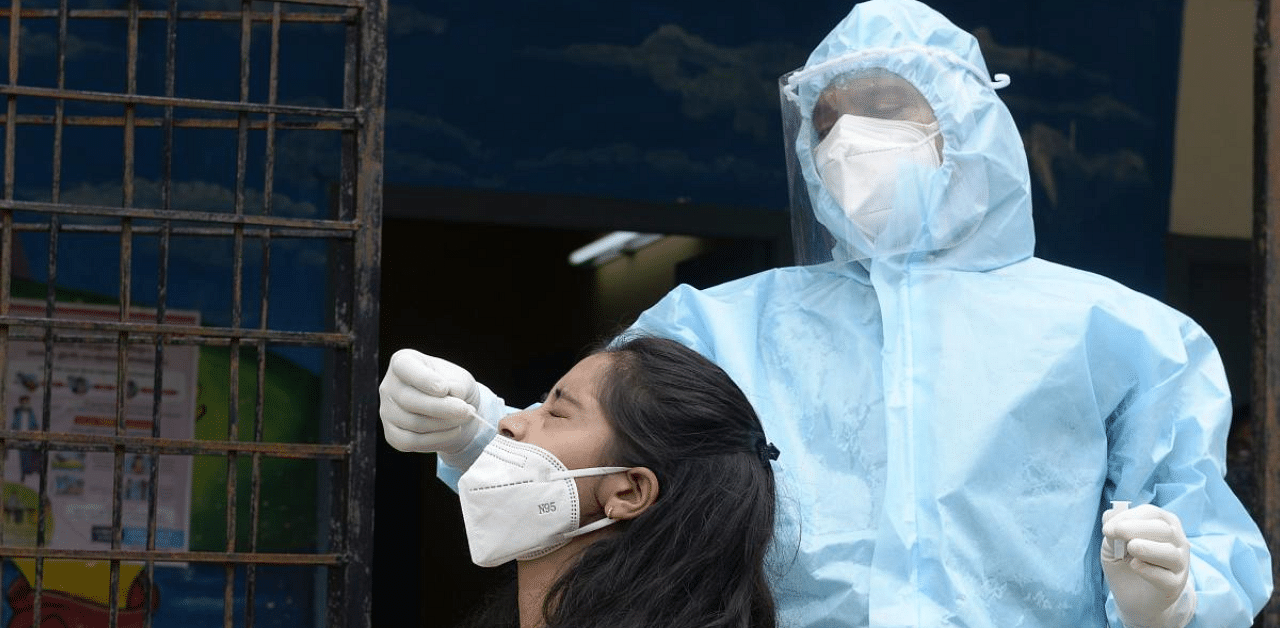
To minimise the spread of Covid-19 in eye care facilities, the Health Ministry has issued guidelines that encourage teleconsultations and following an appointment system for those needing investigations and procedures.
The Ministry also said that eye care facilities in containment zones shall remain closed.
Noting the examination and procedures related to ophthalmology involves close interactions with the patient, the ministry said the guidelines are aimed at minimising the spread of Covid-19 infection among ophthalmologists, ophthalmic assistants/technicians, nurses, support staff, patients and their attendants.
According to the 'Guidelines on Safe Ophthalmology Practices in Covid-19 Scenario', eye drops should be put in the patient's eye by a nursing or paramedical staff with a no-touch technique.
The patient should be asked to pull down his or her lower lid or it should be pulled down with a swab stick.
Pre-surgical Covid-19 test on patients is not mandatory, but a thorough history taking and examination must be done to ensure that patient has a minimal probability of having the infection.
According to guidelines no routine procedure/surgery should be done on a Covid-19 suspect or a confirmed case.
"Tele-counselling and teleconsultation should be encouraged to lessen patient visits and/or appointment system can be followed to call patients needing examination/eye investigations/procedures," the guidelines said.
Eye-care facilities should encourage app-based mobile phone check-in and payment along with a digital prescription of glasses and medicines to prevent long queues, they said.
Screening of patients for cataract and other eye diseases in outreach areas may be undertaken only after duly following social distancing, hand hygiene and personal protective measures.
The identified patients may be called to the base hospital by appointment for cataract surgery, so that backlog of cataract cases does not build up.
"No eye-ball retrieval from homes to be undertaken, only Hospital Cornea Retrieval Program can be continued in non-Covid-19 cadavers, for utilisation of corneas for therapeutic purposes only," the document underscored.
Specific markings may be made with sufficient distance to manage the queue and ensure social distancing in eye care facilities, while the entrance should have mandatory hand hygiene and thermal screening provisions and staff manning these entry points should ensure appropriate personal protection.
Patients should be queried about Covid-19 like symptoms and contact history.
For air-conditioning/ventilation, the guidelines of CPWD shall be followed which emphasise that the temperature setting of all air conditioning devices should be in the range of 24-30 deg C, relative humidity should be in the range of 40-70 per cent, intake of fresh air should be as much as possible and cross ventilation should be adequate.
Effective and frequent sanitation within the premises shall be maintained with particular focus on lavatories, drinking and handwashing stations/areas, the document stated.
The protocols for OPD services calls for promoting digital or app-based registration system, maintaining social distancing, disinfecting OPD premises with 1 pc hypochlorite frequently.
Triaging by an ophthalmologist/ trained ophthalmic personnel may be done either through telephonic conversation to determine the emergency/non-emergency nature of the eye problem and Covid-19 status of the patient and an appointment given accordingly to avoid a rush of patients.
According to the document, chinrest, headrest, tabletop etc. of equipment must also be disinfected after each patient is seen, equipment like slit lamp should have a Plexiglas/breath shield to avoid contact with droplets from patient's breath and that sheet should also be disinfected after seeing any patient.
While performing any contact procedure like Tonometry, Gonioscopy, and Keratometry among other instruments should be cleaned with 70 per cent alcohol swab, before and after every new case.
"Eye drops should be put in the patient's eye by a nursing/paramedical staff with a no-touch technique (ask the patient to pull down his/her lower lid or pull it down with a swab stick)," the guidelines underlined.
Patients and attendants should be screened before entering the wards, only one attendant per patient can be allowed and adequate distancing, regular sanitization of ward and instrument sterilization, it said.
In case a Covid-19 patient with eye condition is to be admitted, a separate room or an isolation ward should be used, the document stated.
Persons above 65 years of age, persons with comorbidities, pregnant women and children below the age of 10 years should be encouraged to stay at home unless they are patients themselves.
All eye care facilities may advise all visitors/staff/patients accordingly, the guidelines stated.
The basic preventive measures include physical distancing of at least six feet to be followed as far as feasible by all patients, staff and visitors, use of face covers/masks to be made mandatory, following hand hygiene and respiratory etiquettes among others.
As for protocols for operation theatre services, no routine procedure/surgery should be done in a Covid-19 suspect or a confirmed case.
Appropriate PPE should be worn by the staff and OT tables, floor and equipment should be properly disinfected after each use, the guidelines read.